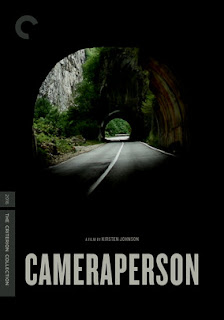Cameraperson
Kirsten Johnson has what is kind of an unsung job: she is the cameraperson for documentaries. She's been doing this for twenty-five years, and took bits and pieces from the many films she's done and made a collage, Cameraperson, that she calls a memoir. It's strangely fascinating.
Johnson shot all the footage, but the films are from other directors. She helpfully puts up title cards as to the locations (but you'll have to stick around for the credits to see the films). They are from an amazingly broad set of circumstances. There is footage shot in hot spots like Bosnia, Darfur, Yemen, Afghanistan, and Colombia, but also in such comparitively genteel places as a Penn State football game (the first home game after the sex abuse scandal hit).
Johnson also includes footage of her life--her twins, and her mother, suffering from Alzheimer's disease. There is only one glimpse of Johnson, when her mother turns the camera on her while she is doing her hair.
While Johnson is the director and camera operator of Cameraperson, a lot of credit has to go Nels Bangerter, as the editor. There is a sequence toward the middle of the film that shows the scenes of great death--in Rwanda, Liberia, Tamir Square, etc., that are calm now. We see a pastoral place or quiet building and then get a total of dead. It hits you right in the gut.
The only film that I've seen from this work is Michael Moore's Fahrenheit 9/11, on which Johnson worked as a camera operator. It shows Moore interviewing a soldier who tells Moore he would rather go to jail than be redeployed. He says he'd rather be incarcerated than kill poor people, another powerful moment.
Johnson has been all over the world for what must be a thrilling but dangerous line of work. It might strike someone that a "greatest hits" package of a documentary cinematographer, along with home movies, might be pretentious, but Cameraperson is anything but. Instead it shows great humanity.
Johnson shot all the footage, but the films are from other directors. She helpfully puts up title cards as to the locations (but you'll have to stick around for the credits to see the films). They are from an amazingly broad set of circumstances. There is footage shot in hot spots like Bosnia, Darfur, Yemen, Afghanistan, and Colombia, but also in such comparitively genteel places as a Penn State football game (the first home game after the sex abuse scandal hit).
Johnson also includes footage of her life--her twins, and her mother, suffering from Alzheimer's disease. There is only one glimpse of Johnson, when her mother turns the camera on her while she is doing her hair.
While Johnson is the director and camera operator of Cameraperson, a lot of credit has to go Nels Bangerter, as the editor. There is a sequence toward the middle of the film that shows the scenes of great death--in Rwanda, Liberia, Tamir Square, etc., that are calm now. We see a pastoral place or quiet building and then get a total of dead. It hits you right in the gut.
The only film that I've seen from this work is Michael Moore's Fahrenheit 9/11, on which Johnson worked as a camera operator. It shows Moore interviewing a soldier who tells Moore he would rather go to jail than be redeployed. He says he'd rather be incarcerated than kill poor people, another powerful moment.
Johnson has been all over the world for what must be a thrilling but dangerous line of work. It might strike someone that a "greatest hits" package of a documentary cinematographer, along with home movies, might be pretentious, but Cameraperson is anything but. Instead it shows great humanity.



Comments
Post a Comment